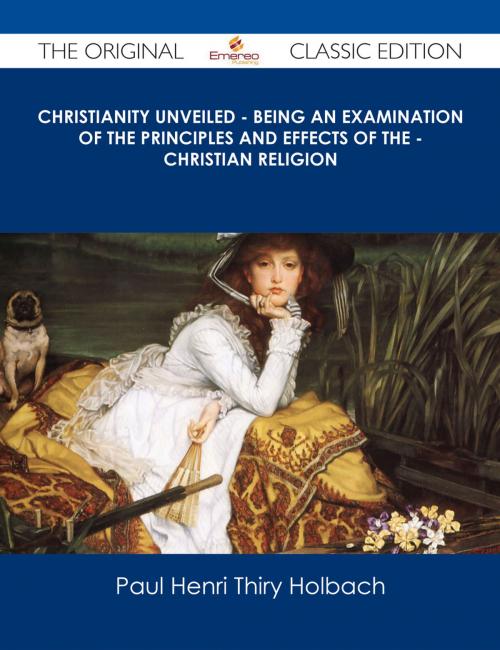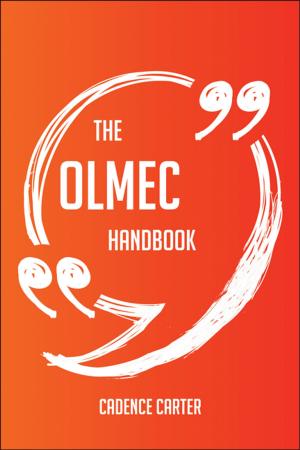Christianity Unveiled - Being An Examination of The Principles And Effects of The - Christian Religion - The Original Classic Edition
Nonfiction, Reference & Language, Reference, Fiction & Literature| Author: | Paul Henri Thiry Holbach | ISBN: | 9781486445257 |
| Publisher: | Emereo Publishing | Publication: | March 18, 2013 |
| Imprint: | Emereo Publishing | Language: | English |
| Author: | Paul Henri Thiry Holbach |
| ISBN: | 9781486445257 |
| Publisher: | Emereo Publishing |
| Publication: | March 18, 2013 |
| Imprint: | Emereo Publishing |
| Language: | English |
Finally available, a high quality book of the original classic edition of Christianity Unveiled - Being An Examination of The Principles And Effects of The - Christian Religion. It was previously published by other bona fide publishers, and is now, after many years, back in print.
This is a new and freshly published edition of this culturally important work by Paul Henri Thiry Holbach, which is now, at last, again available to you.
Get the PDF and EPUB NOW as well. Included in your purchase you have Christianity Unveiled - Being An Examination of The Principles And Effects of The - Christian Religion in EPUB AND PDF format to read on any tablet, eReader, desktop, laptop or smartphone simultaneous - Get it NOW.
Enjoy this classic work today. These selected paragraphs distill the contents and give you a quick look inside Christianity Unveiled - Being An Examination of The Principles And Effects of The - Christian Religion:
Look inside the book:
In fine, you go so far as to agree that a good Christian who follows literally the conduct prescribed to him as the most perfect by the gospel, knows not in this world any thing of those duties on which true morality is founded; and that if he wants energy he must prove an useless misanthrope, or if his temper be warm a turbulent fanatic. ...It is necessary, then, to carefully distinguish Christian morality from political morality; the former makes saints, the latter citizens: one makes men useless, or even hurtful to the world; the other has for its object the formation of members useful to society; men active and vigorous, who are capable of serving it, who fulfil the duties of husbands, fathers, friends, and companions, whatever may be their metaphysical opinions, which, let theologists say what they will, are much less sure than the invariable rules of good sense. ...If it be said that all governments think it their interest to support religious prejudices, and manage the clergy through policy, although they themselves are undeceived; I answer, that it is easy to convince enlightened government, that it is their true interest to govern a happy people; that upon the happiness it procures the nation, depends the stability and safety of the government; in one word, that a nation composed of wise and virtuous citizens, are much more powerful than a troop of ignorant and corrupted slaves, whom the government is forced to deceive in order to satisfy, and to deluge with impositions that it may succeed in any enterprise.
About Paul Henri Thiry Holbach, the Author:
It is impossible to censure him who desires them, to despise him who commands them, but when to obtain them he employs odious means; or when after he has obtained them he makes a pernicious use of them, injurious to himself, prejudicial to others; let him wish for power, let him seek after grandeur, let him be ambitious of reputation, when he can show just pretensions to them; when he can obtain them, without making the purchase at the expense of his own repose, or that of the beings with whom he lives: let him desire riches, when he knows how to make a use of them that is truly advantageous for himself, really beneficial for others; but never let him employ those means to procure them of which he may be ashamed; with which he may be obliged to reproach himself; which may draw upon him the hatred of his associates; or which may render him obnoxious to the castigation of society: let him always recollect, that his solid happiness should rest its foundations upon its own esteem,--upon the advantages he procures for others; above all, never let him for a moment forget, that of all the objects to which his ambition may point, the most impracticable for a being who lives in society, is that of attempting to render himself exclusively happy. ...In the Système social (1773), the Politique naturelle (1773–1774) and the Morale universelle (1776) he attempts to describe a system of morality in place of the
Finally available, a high quality book of the original classic edition of Christianity Unveiled - Being An Examination of The Principles And Effects of The - Christian Religion. It was previously published by other bona fide publishers, and is now, after many years, back in print.
This is a new and freshly published edition of this culturally important work by Paul Henri Thiry Holbach, which is now, at last, again available to you.
Get the PDF and EPUB NOW as well. Included in your purchase you have Christianity Unveiled - Being An Examination of The Principles And Effects of The - Christian Religion in EPUB AND PDF format to read on any tablet, eReader, desktop, laptop or smartphone simultaneous - Get it NOW.
Enjoy this classic work today. These selected paragraphs distill the contents and give you a quick look inside Christianity Unveiled - Being An Examination of The Principles And Effects of The - Christian Religion:
Look inside the book:
In fine, you go so far as to agree that a good Christian who follows literally the conduct prescribed to him as the most perfect by the gospel, knows not in this world any thing of those duties on which true morality is founded; and that if he wants energy he must prove an useless misanthrope, or if his temper be warm a turbulent fanatic. ...It is necessary, then, to carefully distinguish Christian morality from political morality; the former makes saints, the latter citizens: one makes men useless, or even hurtful to the world; the other has for its object the formation of members useful to society; men active and vigorous, who are capable of serving it, who fulfil the duties of husbands, fathers, friends, and companions, whatever may be their metaphysical opinions, which, let theologists say what they will, are much less sure than the invariable rules of good sense. ...If it be said that all governments think it their interest to support religious prejudices, and manage the clergy through policy, although they themselves are undeceived; I answer, that it is easy to convince enlightened government, that it is their true interest to govern a happy people; that upon the happiness it procures the nation, depends the stability and safety of the government; in one word, that a nation composed of wise and virtuous citizens, are much more powerful than a troop of ignorant and corrupted slaves, whom the government is forced to deceive in order to satisfy, and to deluge with impositions that it may succeed in any enterprise.
About Paul Henri Thiry Holbach, the Author:
It is impossible to censure him who desires them, to despise him who commands them, but when to obtain them he employs odious means; or when after he has obtained them he makes a pernicious use of them, injurious to himself, prejudicial to others; let him wish for power, let him seek after grandeur, let him be ambitious of reputation, when he can show just pretensions to them; when he can obtain them, without making the purchase at the expense of his own repose, or that of the beings with whom he lives: let him desire riches, when he knows how to make a use of them that is truly advantageous for himself, really beneficial for others; but never let him employ those means to procure them of which he may be ashamed; with which he may be obliged to reproach himself; which may draw upon him the hatred of his associates; or which may render him obnoxious to the castigation of society: let him always recollect, that his solid happiness should rest its foundations upon its own esteem,--upon the advantages he procures for others; above all, never let him for a moment forget, that of all the objects to which his ambition may point, the most impracticable for a being who lives in society, is that of attempting to render himself exclusively happy. ...In the Système social (1773), the Politique naturelle (1773–1774) and the Morale universelle (1776) he attempts to describe a system of morality in place of the















